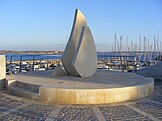From today's featured article
The tomb of Philippe Pot is a life-sized funerary monument commissioned by the military leader and diplomat Philippe Pot. Pot was a godson of Philip the Good and became a knight of the Golden Fleece; he later served the French king, Louis XI, who appointed him grand seneschal of Burgundy, and Louis's son Charles VIII. His effigy shows him recumbent on a slab, his hands raised in prayer, wearing armour and a heraldic tunic. Pot commissioned the tomb when he was around 52 years old, some 13 years before his death in 1493. The inscriptions written on the sides of the slab emphasise his achievements and social standing. The tomb is made of limestone, paint, gold and lead. Although its sculptor is unrecorded, art historians generally cite Antoine Le Moiturier as the most likely designer. The monument was stolen during the French Revolution; since 1899 it has been in the Louvre, where it is on permanent display. The tomb underwent a major restoration between 2016 and 2018. (Full article...)
Did you know ...
- ... that Wing Sam Chinn combined Chinese and Beaux-Arts architecture in his design for a building in Seattle (pictured)?
- ... that the Labour Party of Turkey was banned by the Constitutional Court in 1980 due to its support for the use of the Kurdish language in schools?
- ... that Michael Sugrue became an "internet phenomenon" during the COVID-19 pandemic for his lectures on YouTube, recorded in 1992, that covered "the last 3,000 years of Western intellectual history"?
- ... that Ready Set Learn! was TLC's answer to the PBS children's lineup?
- ... that Shawn Mendes's song "Nobody Knows" was recorded in one take on a "tough night"?
- ... that in 2018 thieves stole 40 percent of the cocoa produced by the São Toméan Organic Cocoa Production and Export Cooperative?
- ... that Matthew Webb died attempting to swim down the Niagara Rapids?
- ... that Mobtown Ballroom and Café enlisted volunteers to build its sprung wood floor by hand – twice?
- ... that an attempt to portray Abbess Hathumoda as a Christian saint after her death failed because everyone knew that she could be quite petulant?
In the news
- In the Japanese general election, the LDP-led ruling coalition loses its majority in the House of Representatives.
- Georgian Dream wins the parliamentary election in Georgia amidst allegations of voting irregularities.
- Tropical Storm Trami (satellite image shown) leaves more than 140 people dead in the Philippines.
- An attack by the Kurdistan Workers' Party on the Turkish Aerospace Industries headquarters in Ankara leaves seven people dead.
On this day
- 1938 – CBS Radio broadcast the radio drama The War of the Worlds, causing panic among some listeners who believed that an actual Martian invasion was in progress.
- 1948 – A luzzu (Maltese fishing boat) overloaded with passengers capsized and sank in the Gozo Channel off Qala, killing 23 of the 27 people on board (monument pictured).
- 1991 – The Madrid Conference, an attempt by the international community to revive the Israeli–Palestinian peace process through negotiations, convened.
- 1993 – The Troubles: Three members of the Ulster Defence Association opened fire in a crowded pub during a Halloween party, killing eight people and wounding nineteen others.
- 2002 – After his terminal-cancer diagnosis, Warren Zevon made his last public appearance on the Late Show with David Letterman, giving the advice to "enjoy every sandwich".
- Miloš Trifunović (b. 1871)
- Dave Gallaher (b. 1873)
- Gustav Ludwig Hertz (d. 1975)
- Jam Master Jay (d. 2002)
Today's featured picture

|
Anna Bartels (1869–1950) was a Swedish operatic soprano and mezzo-soprano. She made her debut at the Royal Swedish Opera in 1897 in the title role of Friedrich von Flotow's Martha. Engaged by the company for the next 20 years, she appeared in many Swedish premieres, such as Musette in Puccini's La bohème (1901), Marianne in Richard Strauss's Der Rosenkavalier (1920) and La Ciesca in Puccini's Gianni Schicchi (1920). Other works in which she appeared include The Merry Wives of Windsor, The Magic Flute, Don Giovanni and Carmen. Bartels is also remembered for her appearances in concerts and lieder recitals. She was awarded the Litteris et Artibus medal in 1923 for her contributions to Swedish culture. This 1901 photograph by the Swedish photographer Ferdinand Flodin shows Bartels in her role as Musette. Photograph credit: Ferdinand Flodin; restored by Adam Cuerden
Recently featured:
|
Other areas of Wikipedia
- Community portal – The central hub for editors, with resources, links, tasks, and announcements.
- Village pump – Forum for discussions about Wikipedia itself, including policies and technical issues.
- Site news – Sources of news about Wikipedia and the broader Wikimedia movement.
- Teahouse – Ask basic questions about using or editing Wikipedia.
- Help desk – Ask questions about using or editing Wikipedia.
- Reference desk – Ask research questions about encyclopedic topics.
- Content portals – A unique way to navigate the encyclopedia.
Wikipedia's sister projects
Wikipedia is written by volunteer editors and hosted by the Wikimedia Foundation, a non-profit organization that also hosts a range of other volunteer projects:
-
Commons
Free media repository -
MediaWiki
Wiki software development -
Meta-Wiki
Wikimedia project coordination -
Wikibooks
Free textbooks and manuals -
Wikidata
Free knowledge base -
Wikinews
Free-content news -
Wikiquote
Collection of quotations -
Wikisource
Free-content library -
Wikispecies
Directory of species -
Wikiversity
Free learning tools -
Wikivoyage
Free travel guide -
Wiktionary
Dictionary and thesaurus
Wikipedia languages
This Wikipedia is written in English. Many other Wikipedias are available; some of the largest are listed below.
-
1,000,000+ articles
-
250,000+ articles
-
50,000+ articles

.jpg/162px-Seattle-Zhonghua-Huiguan-3578_(adjusted).jpg)

